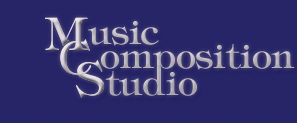Write your own music
Are you intereseted in writing your own music?
Do you have sketches or recordings already?
Do you have musical ideas in your imagination, but are seeking advice for how to turn imagined music into performed music?
Even if you already write your own music, this site and this page is here to help you. You can find out more about me in my bio, or my article on why I compose music.
Soon, yes soon, I'll have some products ready for you to use and learn how to write your own music.
What we need to get ready for is the translation of imagined sound into "visual" sound...yes, that's the process of musical notation.
Others may want you to just "make music," to noodle around with software, hardware, to play and play and play, until you achieve some kind of result.
What we can get excited about here, is beginning to work on the real basics of writing one's own music...namely writing!
It's so silly. So many people write articles about writing music, and they often neglect the concept of "writing music down!" It's incredible!
Talk about the easiest way to improve one's musicianship -- the fastest and most effective way to get one's arms around composition or songwriting -- and it's neglected!
Why?
Maybe it's neglected because it seems hard, but it's only hard, if it's not properly explained or understood. There are very basic, rudimentary principles that can help you write your music down, yet it's incredibly important that those principles be explained in as straightforward and clear a fashion as possible.
In a way, the "easiest" route, is also the "hardest."
From my experience in Martial Arts, my master once said "go slow to go fast." And that stuck with me.
Many basic or simple things are mysteriously difficult to grasp...but one just does it again...one does it slower...one receives instruction...one does it better...one does it with exactness and fluidity...and the slower one goes...when one needs it...POOOF...the speed is incredible.
That's what I'd like for you.
I'd like the opportunity to show you the basics of rhythm and pitch, and give you tools that you can use to write your music down -- for a lifetime.
Musicianship skills last a lifetime. Once you know how to write a song down with nothing but paper and pencil...well, you won't need tons of expensive software and hardware to write your music. Sure, you might use it to record your music, you may even use it to enhance your creative process...but you won't have to.
Many songwriting courses suggest carrying a portable recorder around...which I did for many years...but think of how I felt, when I had nothing but paper and pencil...and I was able to write down a full song...without recording it! It was a fantastic feeling. Nothing better! Believe me, after so many years of feeling "dependent," I had an incredible sense of accomplishment and security.
I can't promise you'll feel the same way, but when I decided to bring myself from being a "songwriter" to being a "composer," I was kind of "scared," in a way. I thought, geeze, I don't want to be the kind of composer, who, when asked to do a choral arrangement has to say "oh, where's my laptop."
This is the situation I imagined...I'm visiting Latvia (I was raised as a Latvian), and someone says, oh, you know, our choir would like to do an arrangement of SuchAndSuch folksong, could you write one for us? Here's X amount of money. And all I have access to is a piano, paper, and pencil...ok, ok, maybe erasers too! Anyway, I couldn't live with the thought that I would "need" the computer in order to compose. It didn't "feel" right. Most of all, it didn't "feel" real to me.
So, I learned to translate my musical imagination into musical notation. Yes, I'm still learning. At the doctoral level, but the process continues.
I'll be adding to this page and my site in the future. Maybe this article has helped you, maybe I've awakened excitement in you to achieve greater musical competence, in order to achieve your goals.
Best,
Dainis W. Michel March 24, 2006
